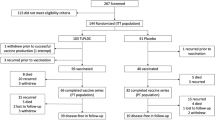Abstract
Background
Although the presence of tumor cells in the blood of patients with metastatic melanoma suggests widely disseminated disease many of these patients enjoy prolonged survival or cure after surgical resection. Our previous study of adjuvant vaccine therapy after complete resection of metastatic melanoma revealed a strong correlation between postoperative survival and elevated antibody titers to a 90-kDa tumor-associated antigen (TA90) expressed by melanoma cells of the vaccine. We hypothesized a similar correlation between postoperative survival and endogenous anti-TA90 antibody titers induced by the patient’s melanoma in the absence of postoperative adjuvant immunotherapy.
Methods
From 1970 to 1996, 64 patients underwent complete resection of distant melanoma metastases and did not receive postoperative adjuvant immunotherapy. Serum collected within 4 months after surgery was tested in a coded and blinded fashion for anti-TA90 IgG and IgM by enzyme-linked immunosorbent assay, and for total IgG and IgM (controls) by radial immunodiffusion.
Results
Median follow-up for the study population was 19 months (range, 3–147 months). There was no significant correlation between anti-TA90 IgG titer and total IgG level (P=.4785), or between anti-TA90 IgM and total IgM (P=.0989). Univariate analysis showed that postoperative anti-TA90 IgM titer as a continuous variable was significantly associated with overall survival (OS); i.e, the higher the anti-TA90 IgM titer, the longer the OS. Using an established cutoff titer of 800, median OS was 42 months for patients with high anti-TA90 IgM titer (n=28) vs. 9 months for patients with low titers (n=36) (P=.0001). There was no significant correlation between total IgG/IgM and survival (P=.4107 and .4044, respectively). Multivariate, analysis identified anti-TA90 IgM as the most significant independent variable influencing OS after complete resection of distant melanoma metastases (P-.0001).
Conclusions
We conclude that the endogenous immune response to metastatic melanoma determines the outcome after surgical therapy. Enhancement of this specific immune response may prolong the survival of patients with distant melanoma metastases.
Similar content being viewed by others
References
Hoon DS, Wang Y, Dale PS, et al. Detection of occult melanoma cells in blood with a multiple-marker polymerase chain reaction assay.J Clin Oncol 1995; 13:2109–16.
Feun LG, Gutterman J, Burgess MA, et al. The natural history of resectable metastatic melanoma (stage IVA melanoma).Cancer 1982; 50:1656–63.
Karp NS, Boyd A, DePan HJ, Harris MN, Roses DF. Thoracotomy for metastatic malignant melanoma of the lung.Surgery 1990; 107:256–61.
Branum GD, Seigler HF. Role of surgical intervention in the management of intestinal metastases from malignant melanoma.Am J Surg 1991; 162:428–31.
Harpole DH Jr, Johnson CM, Wolfe WG, George SL, Seigler HF. Analysis of 945 cases of pulmonary metastatic melanoma.J Thorac Cardiovasc Surg 1992; 103:743–48.
Karakousis CP, Velez A, Driscoll BA. Metastasectomy in malignant melanoma.Surgery 1994; 115:295–302.
Ollila DW, Essner R, Wanek LA, Morton DL. Surgical resection for melanoma metastatic to the gastrointestinal tract.Arch Surg 1996; 131:975–80.
Overett TK, Shiu MH. Surgical treatment of distant metastatic melanoma: indications and results.Cancer 1985; 56:1222–30.
Wong JH, Skinner KA, Kim KA, Foshag LJ, Morton DL. The role of surgery in the treatment of nonregionally recurrent melanoma.Surgery 1993; 113:389–94.
Tafra L, Dale PS, Wanek LA, Ramming KP, Morton DL. Resection and adjuvant immunotherapy for melanoma metastatic to the lung and thorax.J Thorac Cardiovasc Surg 1995; 110:119–29.
Morton DL, Malmgren RA, Holmes EC, Ketchan AS. Demonstration of antibodies against human malignant melanoma by immunofluorescence.Surgery 1968; 64:233–40.
Lewis MG, Ikonopisov RL, Nairn RC, et al. Tumour-specific antibodies in human malignant melanoma and their relationship to the extent of the disease.BMJ 1969; 3:547–52.
Bodurtha AJ, Chee DO, Laucius JF, Mastrangelo MJ, Prehn RT. Clinical and immunological significance of human melanoma cytotoxic antibody.Cancer Res 1975; 35:189–93.
Canevari S, Fossati G, Della Porta G, Balzarini GP. Humoral cytotoxicity in melanoma patients and its correlation with the extent and course of the disease.Int J Cancer 1975; 16:722–9.
Hsueh EC, Famatiga E, Gupta RK, Qi K, Morton DL. Enhancement of complement-dependent cytotoxicity by melanoma cell vaccine: correlation with disease-free survival.Ann Surg Oncol 1998; 5:595–602.
Hsueh EC, Gupta RK, Qi K, Morton DL. Correlation of specific immune responses with survival in patients receiving melanoma cell vaccine.J Clin Oncol 1998; 16:2913–20.
Gupta RK, Morton DL. Monoclonal antibody based ELISA to detect glycoprotein tumor-associated-antigen-specific immune complexes in cancer patients.J Clin Lab Anal 1992; 6:329–36.
Euhus DM, Gupta RK, Morton DL. Induction of antibodies to a tumor-associated antigen by immunization with a whole melanoma cell vaccine.Cancer Immunol Immunother 1989; 29:247–54.
Hellstrom I, Hellstrom KE, Sjogren HO, Warner GA. Demonstration of cell-mediated immunity to human neoplasms of various histological types.Int J Cancer 1971; 7:1–16.
Morton DL, Ollila DW, Hsueh EC, Essner R, Gupta RK. Cytoreductive surgery and adjuvant immunotherapy: a new management paradigm for metastatic melanoma.CA Cancer J Clin 1999; 49:101–16.
Hersey P, Bindon C, Czerniecki M, Spurling A, Wass J, McCarthy WH. Inhibition of interleukin 2 production by factors released from tumor cells.J Immunol 1983; 131:2837–42.
Steinhauer EH, Doyle AT, Reed J, Kadish AS. Defective natural cytotoxicity in patients with cancer: normal number of effector cells but decreased recycling capacity in patients with advanced disease.J Immunol 1982; 129:2255–9.
Feo Figarella E, Morillo F, Blanca I, Bianco NE. Failure of cell-mediated effector mechanisms in lung cancer.J Natl Cancer Inst 1984; 73:1–6.
Monson JRT, Ramsden C, Guillou PJ. Decreased interleukin-2 production in patients with gastrointestinal cancer.Br J Surg 1986; 73:483–486.
Anastasopoulos E, Reclos GJ, Baxevanis CN, et al. Monocyte disorders associated with T cell defects in patients with solid tumor.Anticancer Res 1992; 12:489–94.
Bergman S, Borgstrom S, Tarnvik A. Lymphocyte response to phytohaemagglutinin following cholecystectomy,Acta Pathol Microbiol Scand 1969; 75:363–6.
Berenbaum MC, Fluck PA, Nurst NP. Depression of lymphocyte responses after surgical trauma.Br J Exp Pathol 1973; 54:597–607.
Author information
Authors and Affiliations
Rights and permissions
About this article
Cite this article
Hsueh, E.C., Gupta, R.K., Yee, R. et al. Does endogenous immune response determine the outcome of surgical therapy for metastatic melanoma?. Annals of Surgical Oncology 7, 232–238 (2000). https://doi.org/10.1007/BF02523659
Received:
Revised:
Issue Date:
DOI: https://doi.org/10.1007/BF02523659




